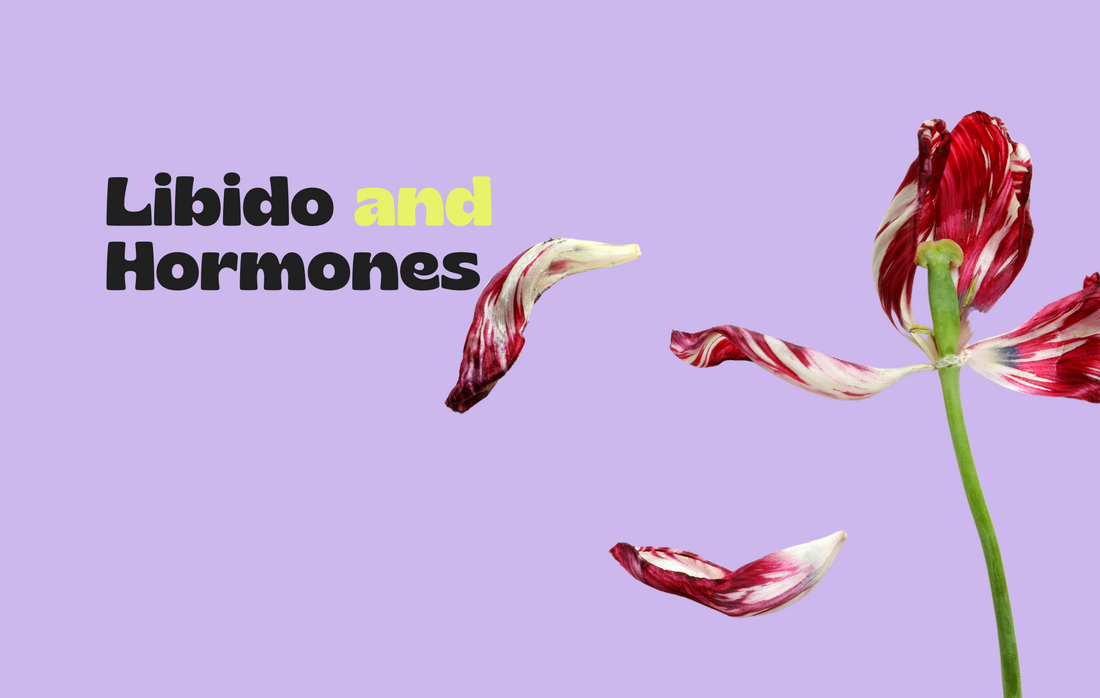Sexual desire, or libido, is a complex interplay of physical, emotional, and psychological factors. Hormones play a significant role in maintaining healthy libido, but as we age, the levels of these hormones can fluctuate, leading to changes in sexual desire. One of the most critical hormones involved in libido is testosterone, often associated with men but just as vital for women. As testosterone and other hormones fluctuate or decline, they can profoundly impact your body and your interest in sex.
In this blog, we’ll explore the link between hormones and libido, focusing on how hormonal changes, particularly testosterone deficiency, can affect sexual desire. We'll also discuss the ways your body changes with age, and most importantly, natural solutions to help boost libido when hormones are no longer working in your favour.
Understanding the Role of Hormones in Libido
Hormones are chemical messengers in the body that regulate various functions, including sexual desire. Among the hormones that affect libido, testosterone is perhaps the most well-known. While often associated with male sexual health, testosterone also plays a crucial role in women’s sexual desire. Oestrogen, progesterone, and even cortisol and thyroid hormones also impact libido, creating a delicate balance that must be maintained for optimal sexual health.
Key Hormones That Influence Libido:
- Testosterone: This hormone is produced in small amounts in women’s ovaries and adrenal glands. Testosterone is essential for maintaining sexual desire, sexual responsiveness, and energy levels. A decrease in testosterone, common as we age, can result in reduced libido, lower sexual satisfaction, and decreased energy.
- Oestrogen: This hormone is vital for maintaining vaginal health, promoting natural lubrication, and supporting sexual arousal. Oestrogen levels naturally decline during menopause, which can cause vaginal dryness and discomfort during intercourse, further dampening libido.
- Progesterone: While progesterone plays a smaller role in sexual desire compared to testosterone and oestrogen, it helps regulate mood and supports overall hormonal balance. Decreased levels of progesterone can lead to mood swings and irritability, indirectly impacting libido.
- Cortisol: Known as the stress hormone, cortisol is produced by the adrenal glands. High levels of cortisol, often triggered by stress, can interfere with testosterone production and lower libido.
- Thyroid hormones: An underactive thyroid (hypothyroidism) can lead to fatigue, weight gain, and depression, all of which can reduce sexual desire.
Testosterone and Its Impact on Libido
Testosterone is often thought of as the "male hormone," but it plays an equally important role in women’s sexual health. It contributes to sexual desire, responsiveness, and overall sexual satisfaction. As we age, testosterone production naturally declines in both men and women, leading to a drop in libido.
How Testosterone Affects Libido:
- Sexual desire: Testosterone is a key driver of sexual desire in both men and women. When testosterone levels are high, sexual interest tends to be higher. Low testosterone can lead to a lack of interest in sex, making intimacy feel like a chore rather than a pleasure.
- Energy levels: Testosterone also contributes to overall energy and vitality. A decline in testosterone levels can cause fatigue, making you feel too tired for sexual activity.
- Mood regulation: Testosterone impacts mood by supporting dopamine production, the “feel-good” neurotransmitter. Low testosterone can lead to mood swings, irritability, and even depression, which can all negatively affect libido.
Signs of Low Testosterone
Both men and women can experience low testosterone levels as part of the natural aging process. However, some factors like stress, poor diet, lack of sleep, and certain medical conditions can accelerate this decline. Here are some common signs that your testosterone levels may be low:
- Decreased sexual desire: A sudden or gradual reduction in libido can be one of the most noticeable signs of low testosterone.
- Low energy levels: Fatigue and feeling sluggish, especially without a clear cause, can be tied to decreased testosterone.
- Mood changes: Irritability, depression, and a general lack of motivation may also be linked to lower testosterone levels.
- Weight gain and muscle loss: Testosterone helps with muscle building and fat metabolism. Low levels may cause an increase in body fat, particularly around the abdomen, and a loss of muscle mass.
- Difficulty achieving orgasm: Lower testosterone levels can also lead to difficulty achieving orgasm or less satisfaction during sexual activity.
How the Body Changes With Age
As we age, our bodies naturally undergo various changes, many of which can affect sexual desire and performance. For women, menopause is a significant transition that brings about hormonal shifts, including a decline in oestrogen and testosterone. Men also experience changes as they age, with a gradual decrease in testosterone production, often referred to as "andropause" or male menopause.
Common Bodily Changes That Impact Libido:
- Vaginal dryness: Due to the decline in oestrogen levels, women often experience vaginal dryness, which can make sex uncomfortable or painful. This discomfort can lead to reduced interest in sexual activity.
- Loss of muscle tone and weight gain: Testosterone helps maintain muscle mass and energy levels. As testosterone declines, it becomes easier to gain weight and lose muscle tone, which can negatively impact self-esteem and body confidence, further reducing libido.
- Fatigue: Both men and women may experience an increase in fatigue due to hormonal changes, making it more challenging to maintain sexual interest and activity.
- Emotional changes: Hormonal imbalances can cause mood swings, anxiety, and depression, all of which can diminish libido. The emotional toll of aging, combined with changing body image, can create a mental barrier to intimacy.
Natural Ways to Boost Libido and Balance Hormones
Thankfully, there are several natural approaches to boosting libido and balancing hormones, helping you feel more like yourself again without resorting to synthetic hormone treatments.
- Exercise Regularly
Physical activity helps boost testosterone levels, increase blood circulation, and improve mood, all of which positively impact libido. Strength training, in particular, helps build muscle mass and can stimulate testosterone production.
- Cardio exercises like brisk walking, swimming, or cycling improve cardiovascular health, which is essential for sexual function.
- Yoga and strength training support flexibility, strength, and stress reduction, which can also enhance libido.
- Eat a Libido-Boosting Diet
Certain foods are known to support hormone balance and boost sexual desire. Here are some key foods to incorporate into your diet:
- Omega-3 fatty acids: Found in fatty fish like salmon, omega-3s support hormonal balance and improve blood flow, which can enhance sexual responsiveness.
- Zinc-rich foods: Zinc is crucial for testosterone production. Foods like pumpkin seeds, spinach, and chickpeas can help maintain healthy hormone levels.
- Dark chocolate: Known for its mood-boosting effects, dark chocolate increases serotonin and dopamine levels, helping to enhance mood and sexual desire.
- Reduce Stress
Stress is one of the biggest enemies of libido. High levels of cortisol, the stress hormone, can reduce testosterone production and lower sexual desire. Incorporating relaxation techniques like mindfulness, meditation, or deep breathing exercises can help reduce stress and improve sexual interest.
- Prioritise Sleep
Sleep plays a vital role in regulating hormones, including testosterone. Aim for 7-9 hours of restful sleep each night to help balance your hormones and improve energy levels, mood, and libido.
- Consider Using The Passion Patch
If you’re looking for a natural, effective way to boost libido without synthetic hormones, The Passion Patch offers an innovative solution. This transdermal patch delivers a blend of eight powerful ingredients known for their libido-enhancing properties, including:
- Fo-Ti Extract: Helps balance hormones and boost stamina.
- Ginseng Extract: Reduces fatigue and improves sexual function.
- Siberian Ginseng: Increases endurance and reduces stress.
- Damiana Extract: A natural aphrodisiac that improves mood and libido.
- Gotu-Kola Extract: Supports circulation, improving sexual health.
- Saw Palmetto Extract: Helps balance testosterone levels and enhance vitality.
- Tribulus Terrestris Extract: Boosts testosterone and improves stamina.
- L-Arginine: Enhances blood flow and supports sexual performance.
By using transdermal technology, The Passion Patch ensures that these ingredients are absorbed directly into the bloodstream, providing a steady, consistent release of libido-boosting nutrients throughout the day.
Q&A: Libido and Hormonal Changes
Here are some frequently asked questions about how hormones impact libido and what you can do about it.
- How does testosterone affect libido in women?
Testosterone plays a crucial role in women’s sexual desire, even though it’s often thought of as a "male hormone." It helps regulate libido, sexual responsiveness, and energy levels. Low testosterone can lead to a decrease in sexual interest, difficulty achieving orgasm, and lower satisfaction with sex.
- What are the signs of low testosterone in women?
Signs of low testosterone in women include a reduction in sexual desire, fatigue, mood swings, weight gain, and difficulty achieving orgasm. Women may also notice a general lack of motivation and lower energy levels.
- How can I naturally increase my testosterone levels?
Exercise, particularly strength training, can help increase testosterone levels. Additionally, eating a diet rich in zinc, omega-3 fatty acids, and vitamin D can support healthy testosterone production. Reducing stress and getting adequate sleep are also essential for maintaining hormonal balance.
- Can stress really impact my libido?
Yes, stress can.
Addressing Libido Changes as You Age
Hormonal fluctuations, particularly with testosterone and oestrogen, are natural as we age, but this doesn’t mean you have to accept a diminished libido as a permanent part of life. Understanding how hormones like testosterone impact your body and libido is the first step towards taking control of your sexual health.
By maintaining a proactive approach through natural methods—such as a healthy diet, regular exercise, stress management, and adequate sleep—you can keep your hormones balanced and your libido strong. Additionally, supplements like The Passion Patch, which use a combination of natural, proven ingredients, offer a safe and effective way to support sexual desire without synthetic hormones.
For many people, managing libido changes during life’s different stages is about focusing on overall well-being. Emotional health, body confidence, and open communication with your partner can play equally important roles in maintaining a fulfilling sex life. Understanding your body and how hormones work allows you to take the necessary steps to support your sexual health naturally.
Taking the Next Step: Embrace Natural Solutions
Hormonal changes might be inevitable, but feeling disconnected from your sexual self doesn’t have to be. By making lifestyle changes and incorporating natural aids like The Passion Patch, you can bring balance to your hormones and rediscover a vibrant, fulfilling sex life.
Hormones like testosterone may naturally decline, but that doesn't mean your sexual desire should disappear with them. Take a holistic approach, listen to your body, and consider natural solutions that not only support your libido but also your overall well-being. With the right tools, you can maintain your vitality, energy, and passion, no matter what stage of life you're in.

